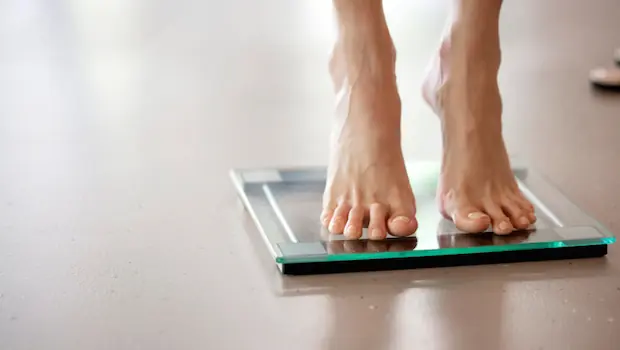
Let's face it: We all have a love-hate (tipping more toward hate) relationship with our scale.
On a good day, the scale is the best friend who cheers you on. On a bad day, the scale is the sworn frenemy who we secretly side-eye. Hot and cold relationship aside, that scale might be one of the most crucial tools you have for weight loss.
A recent study of 91 overweight adults in the Journal of the Academy of Nutrition and Dietetics even found that those who weighed themselves daily lost more weight compared to those who did it weekly, or not at all. But there are actually opposing opinions on the best weigh-in frequency.
In fact, "the benefits of daily self-weighing have long been a topic of interest among obesity and eating disorder experts," says David B. Allison, PhD, director of the Nutrition Obesity Research Center at the University of Alabama at Birmingham.
So, if even the experts can't agree, how often should you subject yourself to the scale? Let's find out—here, we break down the pros and cons of weighing yourself each day.
PRO #1: Daily weigh-ins can serve as a red flag for your system.
With weight loss, ignorance is not bliss. A daily weight check-in can prevent unpleasant surprises—you'll notice any increases immediately (as opposed to weeks or months later when things may have gotten out of hand), and you'll make sure not to gain too much.
However, a Cornell study published late last year noted that this tactic may only be a useful strategy for "certain adults." Who, exactly, are these certain adults? (Our guess: Those who don't relate to Con #1 on Page 2.) But for now, the study's authors are not sure about all the factors at play it will take more research to pinpoint those who will benefit from frequent weigh-ins.
More from Prevention: 6 Simple Ways To Get More Energy Today
PRO #2: Daily weigh-ins will motivate you by monitoring progress.
Tracking your weight-loss journey and keeping an eye on trends can boost your confidence. Even if you're just noticing tiny incremental changes, seeing that your efforts are paying off can help you stick to the plan when your resolve is wavering.
One of the ways that the CDC suggests losing weight is to continually check in with yourself to see how you're improving. What's more, research by the National Weight Control Registry, an organization that tracks people who have successfully lost and kept off weight, also tied that success to daily weigh-ins.
PRO #3: Daily weigh-ins are a constant reminder of your goal.
Your weigh-in can be a reset button—the act of stepping onto the scale every day serves as a course correction. The authors of the Nutrition and Dietetics study cited previous research that self-monitoring spurs people to attain their goals, and experts know that subtle goal reminders influence your eating habits, which keeps bad behavior in check.
Other research in the same study note that daily weigh-ins can even lead to better food and exercise choices. Meaning, you'll think twice about having ice cream or deep-dish pizza for dinner (or skipping a workout) if you know there's a date with the scale the next morning.
- 1
- of
- 2
About the Author

Get ACTIVE on the Go


Couch to 5K®
The best way to get new runners off the couch and across the finish line of their first 5K.
Available for iOS | Android





Discuss This Article